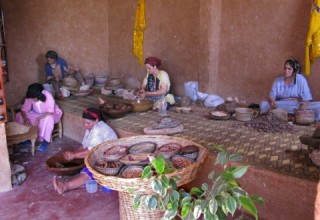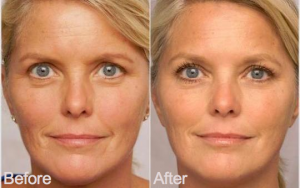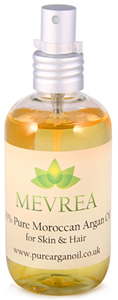Why Argan Oil for Acne Works
 Argan nuts and oil are grown in a small, semi-arid area in Morocco. The Moroccan city of Casablanca, which was made famous by the classic movie named after the city, is Morocco’s largest city and largest port. In 2011, Morocco signed into law a new constitution which gave women equal civic and social rights, in addition to the equal political rights they already possessed.
Argan nuts and oil are grown in a small, semi-arid area in Morocco. The Moroccan city of Casablanca, which was made famous by the classic movie named after the city, is Morocco’s largest city and largest port. In 2011, Morocco signed into law a new constitution which gave women equal civic and social rights, in addition to the equal political rights they already possessed.
Harvesting Argan Oil
Harvesting the argan nuts and processing the oil is a time consuming, labour intensive task. Cooperatives of women undertake these efforts to provide an extra income for the families of this impoverished area, as well as to educate the children and provide for healthcare. Every purchase of Pure Argan Oil helps contribute to Marocavie, a charity set up to support the people of Morocco. Read more about ‘Argan Oil Sustainable Development‘.
 Argan trees have been disappearing at an alarming rate, so regional authorities and UNESCO have worked with locals to preserve this natural resource, and to provide an income for the local people for generations to come. Argan trees have been declared an endangered species and are protected to keep them from becoming extinct. Only the women’s cooperatives are allowed to harvest from the trees. Previously, goats were allowed to graze the trees, climbing up the thorny branches to eat the fruit and foliage. This practice was stopped, and now the goats are not allowed in the area for the three month time period that it takes the fruit to ripen.
Argan trees have been disappearing at an alarming rate, so regional authorities and UNESCO have worked with locals to preserve this natural resource, and to provide an income for the local people for generations to come. Argan trees have been declared an endangered species and are protected to keep them from becoming extinct. Only the women’s cooperatives are allowed to harvest from the trees. Previously, goats were allowed to graze the trees, climbing up the thorny branches to eat the fruit and foliage. This practice was stopped, and now the goats are not allowed in the area for the three month time period that it takes the fruit to ripen.
In Morocco, the Berbers have used argan oil and nuts for centuries for both cosmetic purposes and for food. Its called “Tree of Life” for its important role in the Berber’s culture. Every part of the argan tree is used, and no by-product of the production process goes to waste. The Berber people use the nut shells and wood from the tree for heating wood, and the remainder of the by-products of the oil making process are fed to their livestock.
Argan oil is produced from a rare tree and in limited quantities, and this is reflected in its price. However, it has a shelf life of over a year (ours 18 months), and only a small amount is needed for each application, so a bottle lasts for many months.
How do I get Acne?
Acne has three main causes: excess production of sebum, decreased cell exfoliation, and bacterial growth. The most effective control for acne is to address all three of these issues, while eating a healthy diet and drinking plenty of water. Argan oil for acne aids in all three of these areas.

Argan Oil Before and After
Sebum production is exacerbated by over cleansing the skin, because the lower layers just respond by making more oil. A more effective solution is to thoroughly and gently cleanse with an oil cleanser containing argan oil that does not dry your skin, while opening your pores to a thorough cleansing and sloughing away dead skin cells. Like solutions dissolve like solutions, so the oil gets into your pores and breaks up the oil that binds blackheads and white heads. Argan oil can help control the oiliness of your skin by not causing an overproduction of oil in response to overly drying your skin when cleansing.
How does Argan Oil help alleviate Acne?
This miraculous oil contains higher concentrations of oleic acid than other oils. Oleic acid is used in many types of soap for its emulsifying properties that allow dissimilar solutions to be blended. This allows both oil and water to deeply penetrate and cleanse your pores. Linoleic acid is one of the substances in argan nuts and oil that acts as an anti-inflammatory agent which aids in reducing acne swelling. Linoleic acid also helps your skin to retain moisture. Argan oil contains several compounds, including polyphenols, to increase cell exfoliation.
Argan oil reduces inflammation, the signs of an acne breakout. The antioxidants in argan oil, including vitamin E help your skin to fend itself from bacteria and free radicals. This helps your skin to heal faster, which makes acne scarring go away faster.
How to Use Argan Oil for Acne

Argan Oil used alongside a healthy diet will help reduce Acne
After washing your face in the morning and evening, apply argan oil as a moisturizer. Unlike other oils, argan oil does not feel sticky or oily, since it is so well absorbed. When it is absorbed, all of its nutrients soak into your skin with it. The best results are seen by using argan oil for at least three weeks, but at least two months is a better initial window to see how your skin responds. Use it twice a day, in the morning after you shower, and in the evening after cleansing your face to remove makeup. Argan oil’s consistency is thicker than grape seed oil, but thinner than olive oil, and it has many more nutrients than both.
Your skin is your body’s largest organ. Your skin absorbs everything it comes into contact with, whether it is eaten, applied to the skin, or simply breathed from the air. Avoid all of the toxic, synthetic ingredients contained in even the most expensive masks by using argan oil to make your own homemade mask. As a bonus, you can tailor your mask to your own skin type, and your homemade mask will be fresh.
For acne prone skin, natural face masks with Argan oil and bentonite clay deep clean and tighten your pores. For the cost of one tube of mask, you can purchase a bottle of argan oil, clay, and a few essential oils to mix with foods you probably already have in your kitchen.
Dairy products such as yogurt and buttermilk contain natural acids to gently exfoliate your skin, and leave it soft and hydrated. Unpasteurized yogurt contains probiotics to help your skin fend off bacteria. Cleopatra swore by milk baths for natural beauty. Carrots have antioxidants and have antiseptic properties to help your skin defend itself and heal. Cocoa powder is high in magnesium and antioxidants. Many herbs, such as rosemary, chamomile, sage, lavender, and fennel have antiseptic properties that cleanse and tone your skin without drying. Strawberries contain alpha-hydroxyl acids that naturally exfoliate and deeply cleanse your skin. Unpasteurized (raw) apple cider vinegar with the “mother” intact feed your skin while reducing redness.
Summary
When treating acne, a natural approach that works with your body’s natural immune defences is a sensible approach. Argan oil for acne is an excellent product to help your skin heal from acne and the resulting scarring.
To purchase Pure Moroccan Argan Oil visit this page: www.purearganoil.co.uk/buy


